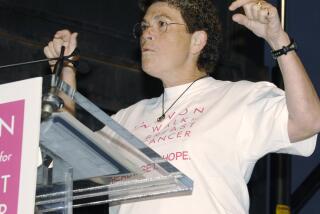Book review: ‘Promise Me’ by Nancy G. Brinker
- Share via
Susan Goodman Komen died of breast cancer at age 36 in 1980, eliciting a deathbed promise from her little sister, Nancy, to lift the stigmatized silence that shrouded her disease. Thirty years later, Susan G. Komen for the Cure has raised nearly $1.5 billion for scientific research, awareness and advocacy. You’ve seen the pink ribbons on lapels, Yoplait containers and American Airlines jets; you may be one of the millions of runners who have participated in a “Race for the Cure” 5K held annually in scores of cities in the United States and abroad. No one calls Suzy Komen’s killer a “women’s cancer” anymore.
There is no surfeit of understatement in Nancy G. Brinker’s forthright memoir, “Promise Me,” starting with its subtitle (“How a Sister’s Love Launched the Global Movement”), but there’s little hyperbole either. Sure, there are elements of hagiography — it’s hard to devote your life to the memory of your sister without downplaying her flaws — and some of the tales of the foundation’s beginnings have the retold ring of creation myths. But this really is quite a story, and as 3-year-old Suzy is reported to have said upon first meeting her newborn sister, “Well! She’s quite a character.”
If only all good causes had a champion with Brinker’s combination of style, chutzpah and well-connected wealth. In Brinker’s telling, the seeds of her future were sown early by her determined, capable and endlessly generous mother, a lifelong volunteer who was “unfashionably fearless about questioning the judgments of God and doctors who think they’re God’s golf buddies.” Growing up solidly middle class and Jewish in Peoria, Ill., the Goodman girls were baking cupcakes for polio charities in elementary school.
Brinker tells her story in two modes, chapters of lively family memoir alternating with vignettes on the history of the disease, the founding of her organization and the inspiration provided by survivors and researchers. She keeps her weight firmly (and wisely) on the former — what could have been a sermon on cancer, philanthropy and cause-related marketing is instead a surprisingly diverting read. Dyslexia, divorce, diagnoses, death: Brinker has had a bumpy ride, and her personal challenges (including her own bout with breast cancer) are the motors that drive the story. Her ferociously positive energy — and her unabashed enthusiasm for attractive men, polo ponies and three-quarter-length sleeves — keeps the whole thing from feeling like a variation on the Book of Job.
The Goodman sisters were soul mates with distinctly different souls. Suzy, married and the mother of two in Peoria, was thrilled to “live well, do good, and look great doing it,” but Nancy had always intended to “make some noise.” Moving to Dallas after college, she found success working at Neiman Marcus and in public relations and broadcasting but floundered in her personal life. The year of Suzy’s death was both a nadir and a new beginning: Soon after the funeral, Nancy found herself on a date with Norman Brinker, a charismatic mogul 16 years her senior, who completed her introduction to the upper echelons of Dallas society. They were married within months. “Norman Brinker didn’t create me,” she writes, “but he planted me like a tree.” Armed with his confidence — and his contacts — she was able to embark on the fulfillment of her promise to her sister.
The final section of the book — after a traumatic brain injury on the polo field compromises Norman’s health and the marriage — lacks the verve of the preceding chapters. With SGK humming along, Brinker detoured into a stint as U.S. ambassador to Hungary and another as White House chief of protocol under George W. Bush. In 2009, she received the Presidential Medal of Freedom. The scrappy-gal narrator of the bulk of the book is occasionally drowned out by inspirational voices recast in the context of the fight against breast cancer, including, for example, Martin Luther King Jr. (“How long? Not long.”) and John F. Kennedy (“That challenge is one that we are willing to accept, one we are unwilling to postpone, and one which we intend to win.”).
But Brinker’s natural tendency toward straight talk never lets this swelling soundtrack dominate. “We all want the same thing,” she writes, “which is, bluntly, fewer dead women.” Few of us walk the walk the way she has.
Nimura is a book critic and essayist.
More to Read
The biggest entertainment stories
Get our big stories about Hollywood, film, television, music, arts, culture and more right in your inbox as soon as they publish.
You may occasionally receive promotional content from the Los Angeles Times.










